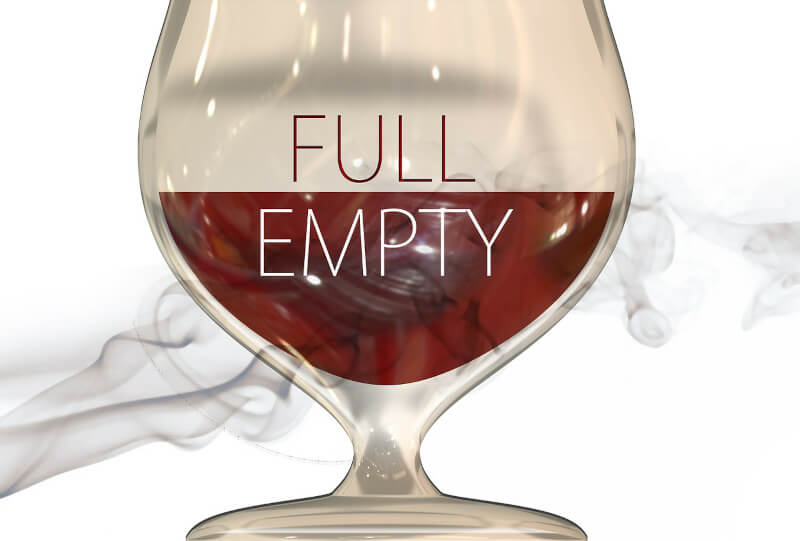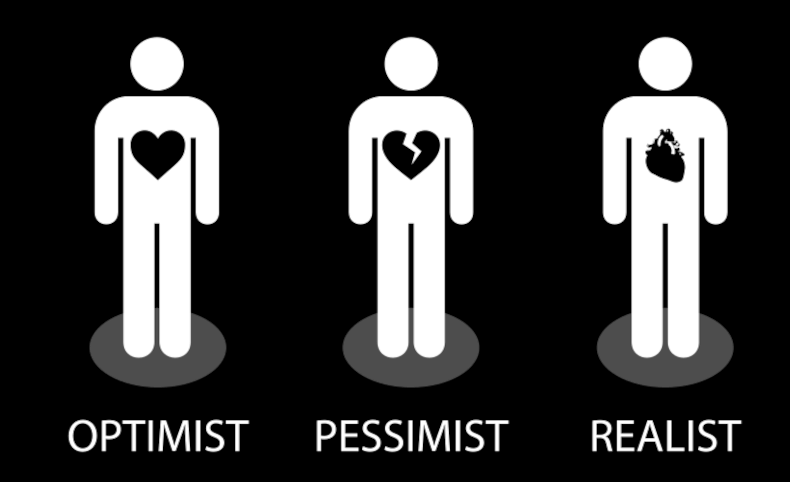There are heroes and villains in movies. Your life has both heroes and villains because it exists in the actual world. They, too, must live in balance with one another, like the yin and yang. The maintenance of global equilibrium is crucial. A positive and balanced outlook is something everyone aspires to achieve. What characteristics mark a healthy mind? To what extent do optimists, pessimists, and realists differ? Who are you, exactly? It’s time we learned more about these three characters.
Distinctions Between Optimists, Pessimists, and Realists
One who is an optimist tends to look on the bright side of life. The negative and the bad are all that the pessimist can see. In contrast, a realist doesn’t care if the outcome is positive or negative. They are focused on the here and now.
What Is an Optimist?
Optimists are more likely to start their days on a positive note. You just know that today is a good day and that it will keep getting better from here on out. An optimist always looks on the bright side. When things don’t go as planned, you’re quick to place blame on others. When you’re stuck in a situation where you know you’ll eventually fail, you start looking for ways out. It’s beneficial to maintain an optimistic outlook and an optimistic state of mind. But, like with any good item, the excess can be bad for you.
What is a Pessimist?
Perpetually gloomy people are known as pessimists. Researchers have shown that pessimists, like optimists, focus on the end goal but have a more pessimistic outlook. Defensive pessimism refers to the practice of allowing one’s pessimistic outlook to help one achieve their objectives. Unexpected outcomes and results can be achieved with this approach.
Are you a Realist?
You take life very seriously. You have an uncanny ability to see reality as it is. A realist recognises the existence of both good and evil and is not swayed by either optimism or pessimism. A realist disregards any attempt to establish a moral hierarchy. They believe it is preferable to forget about math and enjoy themselves. However, for a realist, it can be difficult to strike a balance between the two extremes.

Understanding Wealth Disparities In today’s world, the chasm between the wealthy elite and the…

Abusive behavior, neglect, breakups, and total mayhem in the household can be among the most…

Do You Suffer From Some Kind of Anxiety Disorder? If you recognize yourself in several…
The Distinction
Being a realist appears to involve balancing two equally weighted pans on a beam. In this beam, good and evil are equally weighted. Many people, however, dispute this view. Both pessimists and optimists can see what’s happening now. The way each individual perceives and responds to adversity determines which of these three categories applies. One’s behaviour may be influenced by either exaggerating one’s difficulties or one’s attention on either the positive or negative outcome.
The Pessimist and the Realist
A pessimist has a gloomy and despondent outlook on life. Things are falling through for you, and you feel like your luck is running out. If there’s an issue, you immediately start whining. You don’t want to do anything to fix the issue. A realist is someone who accepts the possibility that their planned path in life may suddenly be interrupted. When you open the door, good things start to come in. A realistic outlook allows for an objective assessment of situations. You don’t weigh the situation via a positive or negative lens.
An impartial realist is hard to find. It’s not always possible or helpful to maintain objectivity. Realists have a bad reputation because pessimists tend to discount the positive and accept the negative as inevitable. Pessimists consider themselves realists since they anticipate the worst-case scenario more often than not.
The current state of the globe has influenced their outlook negatively. A true realist is aware of both the negative and positive aspects of a situation. They have excellent observational skills. They desire to pay close attention to everything going on around them.
Glass Half Full, Glass Half Empty: An Optimist and a Pessimist

Optimists are drawn to situations where they stand to benefit. To you, failure is not anything to be ashamed of. Instead, you see setbacks and triumphs as two sides of the same coin that must coexist to thrive.
You never have a bad day and can always find something positive about any situation. You’re willing to gamble in the hopes of a lucrative payoff. Optimists are more likely to create groundbreaking discoveries and contribute game-changing innovations because of their positive outlook and can-do mentality.
They have high expectations that all of humanity’s issues can be resolved. They believe the COVID outbreak can be contained and normalcy restored rather quickly. Optimists are the group least inclined to worry about a pandemic. When applied realistically, optimism can be more powerful. Recognizing the potential for bad feelings to accompany the scenario will help you gain a more realistic perspective.
Influences of Positivity
Optimists Have a Lot of Self-assurance
When things get difficult, they keep going. People with this outlook tend to believe that they can overcome any difficulty they encounter. However, optimists might do more harm than good if they consistently underestimate the likelihood of adverse events. Irrational optimism is a trap you should avoid.
Positivity and Self-assurance Are Great Qualities
Overconfidence, on the other hand, can lead you to take unnecessary chances and end yourself in unpleasant circumstances. You have an optimistic outlook on life and tend to believe that you and your loved ones are immune to harm. The COVID virus has spread worldwide. You have unrealistic expectations that you won’t get it, and you don’t practise good hygiene. You are endangering your health and the health of others you care about.
One More Scenario Where an Optimist May Come Up Short
An upbeat, enthusiastic, and impulsive individual makes the bold choice to launch a new venture. They put a lot of money down as initial capital without first understanding the nature of the business and the state of the market. In your opinion, what are the possibilities for the company? Success in business requires more than just enthusiasm, drive, and money. You need to conduct market research to learn about the tastes and purchasing power of your target audience.
Can Pessimism Be of Any Use?
The two main types of pessimism identified in the literature are defensive and depressive.
You’re being defensively pessimistic if you arm yourself with the knowledge that bad things can and will happen to you at any time. You’re taking measures to head off the bad outcome. There is still a chance that things could go worse, despite your best attempts to prevent that from happening.
This is your defence mechanism against potential heartbreak. This is your natural defence. Defensive pessimism is an extreme bias towards viewing and concentrating on the bad aspects of any given scenario.
When pessimism contributes to mental health issues like stress, anxiety, and depression, we call that “depressing pessimism.” Adults may become suicidal as a result of this. Defensive pessimism is the preferred outlook since it helps one avoid potential negative outcomes. Defensive pessimism has this effect because it highlights the potential drawbacks of your choices. A healthy dose of pessimism can spur you on to greater physical and mental fortitude.
Is It Possible to Have Both a Positive and a Negative Outlook?

A pessimistic optimist is someone who has both positive and negative outlooks on life. Even if they worry and think negatively, they can see the bright side of things.
Do You Like to Deal with Reality or Not?
The realist viewpoint is now held by some as the healthiest option. Both optimism and pessimism can be thought of as extreme forms of the attitudes they represent. A more realistic outlook on life can be achieved by striking a balance between these two poles. Logical and pragmatic, realists are open to evidence. They have a dispassionate memory and can give a more precise account of events.
Everyone wants to live a life that’s just right. It’s human nature to automatically associate positivity with success and pessimism with failure. You aim for the medium ground between extremes of optimism and pessimism. You give equal weight to possible negative and positive consequences.
Exactly what Traits Do Idealists Possess?
A realist’s polar opposite is an idealist. A realist may view the world as it is, while an idealist envisions how it could be. One who seeks the highest and best ideals is an idealist. An idealist, as opposed to a realist, has no grounding in reality and is a hopeless romantic.
An idealist thinks everything is just fine the way it isAn optimist believes that fortune favours the deserving. Everyone is different. Information processing varies from person to person. There are benefits and drawbacks to each personality feature. There is no superior option. If you want to keep your mind in good shape, you need to strike a balance.
There’s no harm in hoping for the best while also accepting reality. Having a firm grasp of reality and an understanding of how things function is of utmost importance. It’s possible to hold out optimism while preparing for the worst.
Learn to Embrace Your Joy
Happiness cannot be gauged by some characteristic of your character. It is the right of every person to experience joy. Your standards for joy are the most relevant. It makes no difference what you believe or what kind of person you are. What matters is that you’re comfortable with who you are and the choices you’ve made. Everyone aspires to be as upbeat as optimists. However, this is not the situation. True joy cannot be attained by relying just on one’s optimism. There is nothing real or substantial about this joy. Don’t lock yourself up in your mind. You are not your personality. No matter how bad things become, you have to choose happiness.
Some helpful sites that help with behaviour change cycles.
- Discover the importance of nurturing your gut microbiota in supporting alcohol addiction recovery.
- Learn valuable tips and techniques for staying strong and resilient during your addiction recovery journey.
- Discover the benefits of exercise in managing anxiety.
- Learn about the benefits of sober living homes in South Africa as a supportive environment for individuals in early recovery.
- Find out about the coverage and options provided by Discovery Health for addiction treatment.



